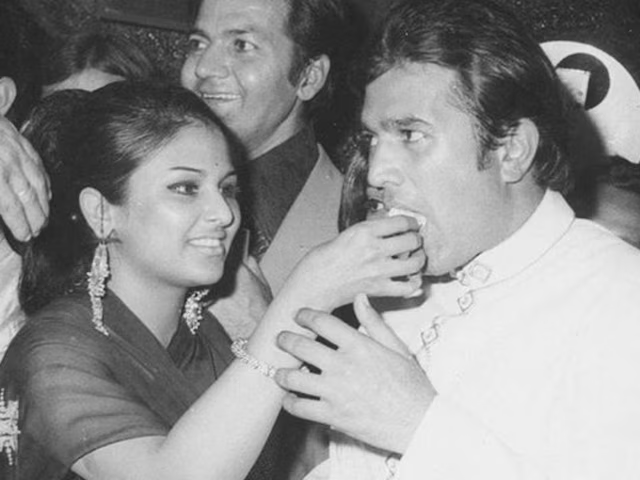Rajesh Khanna, the legendary superstar of Indian cinema, had a complex and often tumultuous relationship with actor Anju Mahendru.
In a candid interview, Anju Mahendru had revealed how Khanna’s orthodox views clashed with her modern lifestyle, leading to conflicts over her clothing choices.
The late superstar Rajesh Khanna’s tumultuous relationship with actor Anju Mahendru was a subject of fascination for decades, even as he navigated his marriage to Dimple Kapadia and a later involvement with Tina Munim. The saga between Khanna and Mahendru, which spanned years of silence and unresolved emotions, was highlighted in a revealing 1987 ‘Screen’ magazine article. The piece featured candid interviews with all three key women in Khanna’s life—Anju, Dimple, and Tina—alongside Khanna’s own reflections, as he sought to explain and defend his actions.
Anju recalled the awkwardness of their first conversation after nearly 17 years of estrangement. “When we spoke to each other for the first time after almost 17 years, I admit that both of us felt a bit awkward. I didn’t call him Jatin as I used to in the past, and he didn’t call me Nikki. I didn’t call him Kaka either. It would have been too filmy,” she said.
Unlike many others, Anju never succumbed to the overwhelming influence of Khanna’s stardom. He often shared film rushes with her, hoping for praise, but she remained unsparing. “I was critical because that’s how I am. If he was bad, I always said so. Why should I have praised him just to keep him happy? There were plenty around to boost his ego. He has always been sensitive to criticism, and I’ve always been very frank,” Anju revealed.
Khanna, for his part, admitted that he didn’t necessarily seek praise, but rather a simple nod of approval. “I didn’t expect praise. All I wanted was a nod of approval… A gesture that reassured. But she was always ruthlessly critical,” he reflected. Despite his superstar status, Khanna was drawn to Anju’s company more than anyone else’s. After work, he would become frantic if she wasn’t in the bungalow he had gifted her, even going as far as calling her friends and tracking her down. “The world was after me, and I was after her,” Khanna confessed, his tone reportedly bitter.
Anju offered insight into the complexities of Khanna’s character, describing him as “a very orthodox man” who paradoxically found himself attracted to ultra-modern women. “I know it’s a contradiction, but then Rajesh Khanna is like that. Confusion was a part of our relationship. If I wore a skirt, he’d snap, why don’t you wear a saree? If I wore a saree, he’d wrinkle his nose and say, why are you trying to project a Bhartiya nari look?’” she recalled, highlighting the contradictions that marked their relationship.
Khanna’s behavior was similarly perplexing with Dimple, whom he often ignored. “Everywhere I went, I was told that I was the most gorgeous woman in the world. But I never got a word of praise from him. It was as if he hadn’t noticed me,” Dimple said. In a passive-aggressive move, Khanna even ensured that his wedding procession passed by Anju’s house, yet she still cared enough to call theatre owners and inquire about his films’ success. The ‘Screen’ article poignantly observed, “His perverseness was the other side of his generosity. His cruel moods alternated with his gentle nature,” capturing the duality that defined Khanna’s relationships and persona.
Known for his charming screen presence and unique style, Rajesh Khanna enjoyed unparalleled popularity during his peak, with his films often running to packed houses. His romantic image, combined with his soulful performances, endeared him to millions of fans, earning him the nickname “Kaka.”
Despite facing a decline in his career during the late 1970s and 1980s, Khanna remained an enduring figure in the industry. He later transitioned to television and politics, serving as a Member of Parliament for the Indian National Congress from 1992 to 1996.
Rajesh Khanna passed away on July 18, 2012, leaving behind a legacy as one of the most beloved and influential actors in Indian cinema history.
